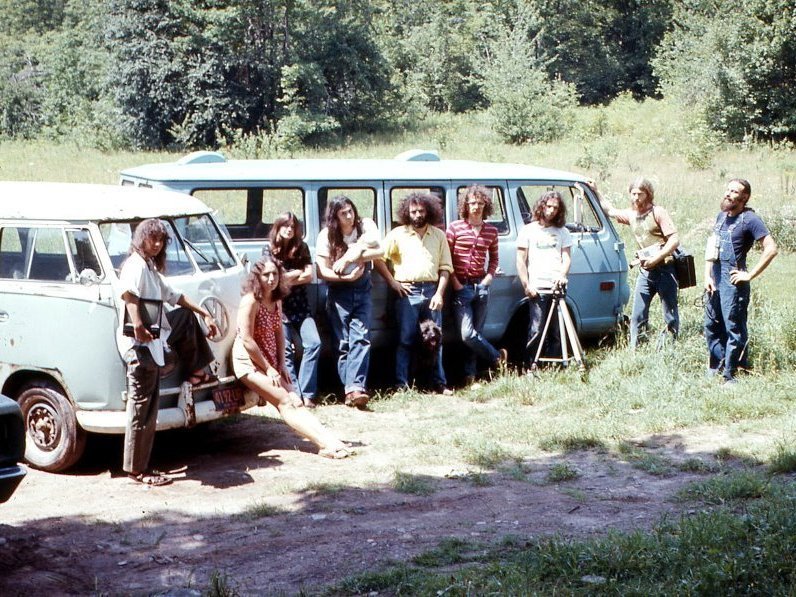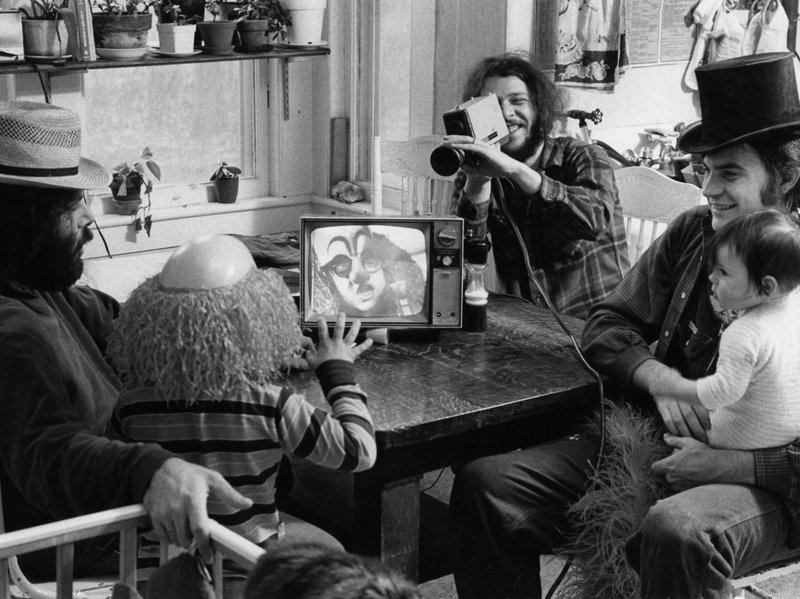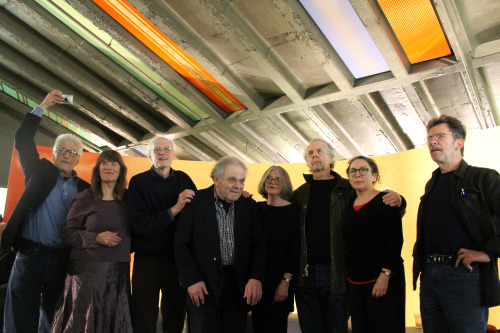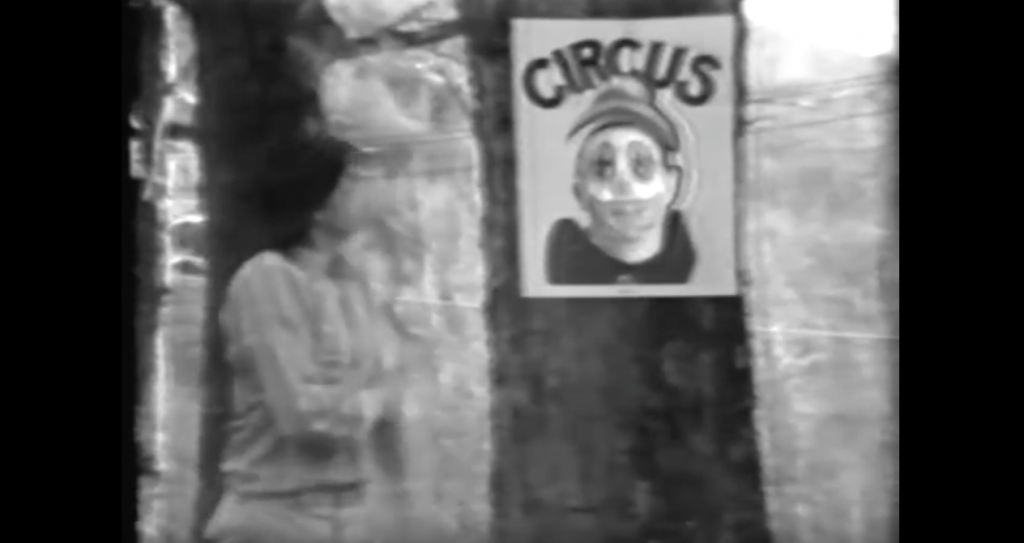I took videos during my trip in Vancouver, edit it on my phone, uploaded on Instagram and now it’s on the net for everyone in the world to see. But back in the 70s, it was another different ball game.

Videofreex including Parry Teasdale and David Cort, fourth and fifth from left, Bart Friedman, third from right, and Skip Blumberg, second from right, gathered in their Catskills town in 1973.
Courtesy of Videofreex
Reading up on Videofreex’s history online, I realise their story is worth mentioning and actually worth doing a documentary about. Actually, there’s already a documentary about the Videofreex! Here’s the link if you want to know more about it! And here’s a review for the documentary by The Hollywood Reporter.
Anyway, let’s start knowing who are the Videofreex by watching the documentary titled ‘Here Comes The Videofreex’ Trailer!
To understand Lanesville TV, I feel that we need to look back briefly at their history. After CBS hire them to do a show on counterculture, they went on to video demonstrations and even interviews Fred Hampton of the Black Panthers! They went the opposite direction of commercial television and were ahead of their time and thats what make CBS reject the Videofreex. That is where they decided to start afresh by moving upstate into Lanesville, NY. Lanesville TV was born.

From left, Videofreex David Cort, Bart Friedman and Parry Teasdale filmed kids’ programs and daily goings-on in 1973 at their Maple Tree Farm in Lanesville, N.Y.
John Dominis/Courtesy of Videofreex
In a nutshell, Lanesville TV is believed to be the country’s first pirate television station. Using a transmitter, they were able to show videos they make to the public. Videofreex’s Bart Friedman remembers it as basically public access TV. This is huge actually! They have the power and technology to actually show things to the public! With huge responsibility, they did not disappoint.
“We got the kids to participate in the kids’ programs, we covered stocking of the stream, the firehouse, local residents, car accidents, gun club dinners, things like that,”
Bart Friedman (Videofreex).
Here’s a 6 minute sampler of Lanesville TV.
I found a video on youtube, showing full clips of their tv show.
Press Watch On Youtube! I particularly want to point out that they even use basic effect to enhance the viewing pleasure for the kids show, which I thought was pretty amazing in the 70s!
It would be amazing if the Videofreex were still active today and they will definitely participate in the NetArtizens Project. Videofreex’s vision for the world to see their own show was very forward looking but unfortunately, the internet wasn’t born yet during their time. I feel that given their restricted access to share their work, they did a pretty good job in making Lanesville TV happen. Imagine what Videofreex can do now with the Internet!

Skip Blumberg, Mary Curtis Ratcliff, Parry Teasdale, David Cort, Carol Vontobel, Davidson Gigliotti, Ann Woodward and Bart Friedman
We’re All Videofreex: Changing Media & Social Change from Portapak to Smartphone Friday, April 5 2013
I agree that the power of video is very much powerful. It doesn’t matter if its a short film, video art, internet tv or even videos on youtubes. With the help of the internet, videos are actually more powerful as they are able to reach the masses. Looking at Videofreex’s history and their project using videos, I am able to see that life doesn’t always have to be about commercialise like the NBC, CBS or ABC. It’s about pushing boundaries of what technology can do for us artists.
We strongly feel that the media arts have not fully embraced this potentiality, despite the progressive nature of the field.
-Catlow, R., Garrett M., Packer R., “The NetArtizens Project,” (2015)
There are currently full time bloggers out there who uses videos to actually share their life with their viewers/subscribers. They practically walk around town with their hands holding their digital cameras and talking to themselves. They will then upload it onto youtube and this make take a while before it reaches to their fans.
This is where the NetArtizens.tv might help them or even us. By doing real time ‘vlogging’ (video blogging), the interaction between the audience and the blogger will be an instant and using the internet as an engine to power up people’s stalking mode. Imagine, me, Kamarul, wearing a google glass, with a camera facing in front, walking and doing my normal routine day, and anyone is able to see what I see just by going to a website. Now that’s technology.

I totally agree with you. More to say, with technology evolving and the introduction of gadgets like GoPro Cameras, people are finding reasons to record segments of their life and sharing it with the whole world. That I appreciate. But there’s always two sides to the coin. As much as seeing people talking to themselves, technology has also given opportunities to record people making love. Believe it or not, sex tapes have become the trend and have actually created a new neighbourhood within pornography. I mean look at what happened to Kim Kardashian. She is star! So what do you think about this side of the coin? Is being open and freely broadcasting really an advantage these days?
Yes I agree with the idea of the sex tapes. It’s like an express ticket to stardom! I believe there must be a line where we don’t cross when we are broadcasting ourself. Even reality shows in America, they show their daily life however, I always believe there are certain things or topic they omit out from the final cut before showing it on Television, that’s what editing are for. But what if we have nothing to hide in life, does that give our right for people to watch us 24/7?
Kamarul, I am really pleased to see you connected with the Freex. I thought you would! Now, your conclusion about broadcasting with google glass is a great idea for a project. Your eyes become our surrogate eyes. Now just imagine if you had done this at ISEA, we could have all “been there.” You just reminded me of Steve Mann, who I should have included in this lecture. Google him and it will blow your mind. A true Videofreek! He has been doing for thirty years what you are talking about.